The 6th of September this year carried a unique weight for Muslims worldwide. It marked what many regarded as the 1500th anniversary of the blessed birth of the Prophet Muhammad ﷺ, a moment that holds deep spiritual and emotional significance for more than a billion believers. Known traditionally as Milad-un-Nabi ﷺ or Mawlid al-Nabi ﷺ, this day has been observed for centuries in remembrance of the arrival of the final Messenger of Islam, who transformed the course of human history with his message of monotheism, compassion, and justice.

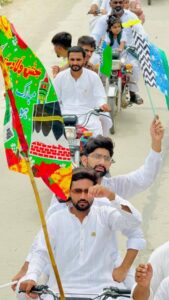

This year, the event was commemorated with unprecedented enthusiasm. From the streets of Pakistan to the avenues of Istanbul, Cairo, Jakarta, London, and New York, Muslims organized grand processions, decorated mosques, held night-long gatherings of dhikr (remembrance), and distributed food to the poor. The celebrations were not just cultural expressions, but profound reflections of love, gratitude, and devotion toward the Prophet ﷺ.
The Significance of the 1500th Anniversary:
While Milad-un-Nabi ﷺ is celebrated annually on the 12th of Rabi-ul-Awwal according to the Islamic lunar calendar, the symbolic milestone of 1500 years gave this year’s commemoration an extraordinary dimension. For Muslims, the Prophet ﷺ is not only a spiritual guide but also a timeless example of character, humility, and leadership. Marking fifteen centuries since his blessed birth allowed believers to reflect not only on history but also on the enduring relevance of his teachings in today’s modern, globalized world.
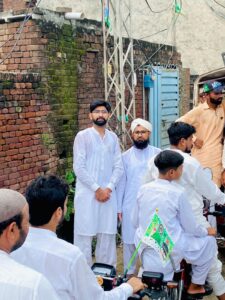
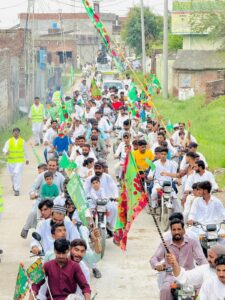
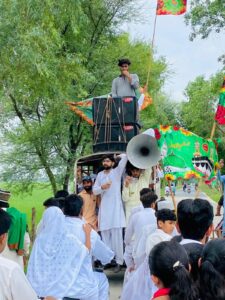
Pakistan: Streets Lit With Devotion:
In Pakistan, the celebration of Milad-un-Nabi ﷺ is always a massive public affair. But this year, on the 6th of September, the country’s cities and towns transformed into illuminated centers of faith and festivity.

-
Karachi: The city witnessed some of the largest processions in its history. Thousands of men, women, and children took to the streets, waving green flags, reciting naats (poetic praises of the Prophet ﷺ), and distributing sweets. Clifton, Saddar, and other central areas glowed with decorative lights, while mosques were adorned with banners declaring messages of peace and unity.
-
Lahore: Processions in Lahore started early in the morning. From Data Darbar to Badshahi Mosque, crowds of devotees carried out parades, while naats competitions and Qur’an recitation events filled cultural centers. Entire neighborhoods, including Anarkali and Shahdara, were lit with green and white lights symbolizing peace and faith.
-
Islamabad and Rawalpindi: The twin cities saw massive rallies organized by religious organizations, universities, and community groups. Food stalls lined the procession routes, offering free meals to participants. In Faisal Mosque, scholars delivered lectures reminding the audience about the mercy and compassion of the Prophet ﷺ.
The government also declared public holidays, and television channels broadcast special transmissions that highlighted the Prophet’s ﷺ life and teachings.
Celebrations Across the Muslim World:
While Pakistan stood out for its scale, the global Muslim community also participated with equal fervor.
-
Turkey: In Istanbul, special gatherings were held at the Blue Mosque and Hagia Sophia Mosque. The Turkish government hosted scholarly conferences on the life of the Prophet ﷺ, drawing scholars from across the Muslim world.
-
Egypt: Cairo’s Al-Azhar Mosque was the epicenter of Egypt’s commemoration. Religious leaders emphasized the Prophet’s ﷺ role as a unifier and reformer. Street processions were filled with chanting, drumming, and children carrying lanterns.
-
Saudi Arabia: In Makkah and Madinah, while official celebrations were more subdued, pilgrims and residents alike filled the mosques with night-long recitations of Qur’an and salawat (praises upon the Prophet ﷺ). The green dome of Masjid al-Nabawi became a central focus of devotion, attracting Muslims from around the world.
-
Indonesia and Malaysia: As countries with the largest Muslim populations, Indonesia and Malaysia marked the day with colorful parades, government-sponsored cultural shows, and Qur’anic recitation competitions. In Jakarta, a sea of green flags swept through the main streets as people gathered to remember the Prophet ﷺ.
-
Western Countries: Muslim communities in Europe and North America also organized events. In London, processions passed through Hyde Park and Regent Street, attracting both Muslims and non-Muslims, curious to witness the celebrations. In New York and Toronto, mosques held open-house programs where interfaith leaders participated, highlighting the Prophet’s ﷺ universal message of peace and compassion.
Themes of the Celebrations:
Across all countries, the celebrations shared certain common themes that reflected the heart of Milad-un-Nabi ﷺ:
-
Love and Devotion: Believers expressed their love through naats, poetry, and public gatherings.
-
Unity: The day brought together Muslims of different sects, schools of thought, and ethnic backgrounds under the banner of devotion to the Prophet ﷺ.
-
Charity: Food distribution, medical camps, and donations for the needy were widespread. Many saw this as a practical way of following the Prophet’s ﷺ example of generosity.
-
Spiritual Reflection: Beyond the festivities, mosques and centers held seminars and lectures where scholars spoke about how the Prophet’s ﷺ teachings remain relevant to today’s social, economic, and moral challenges.
Why This Milestone Matters Today:
Marking the 1500th anniversary of the Prophet’s ﷺ birth was not just about looking backward. It was equally about recognizing how the timeless guidance of Islam continues to shape lives today. In a world struggling with inequality, conflict, and disconnection, the example of the Prophet ﷺ offers lessons in patience, forgiveness, justice, and humility.
For many Muslims, this milestone was a reminder that while centuries may pass, the light of Muhammad ﷺ will never fade. His legacy continues to inspire reforms in education, humanitarian work, and interfaith dialogue.
Conclusion:
The 6th of September, 2025, will be remembered as a historic day for the Muslim Ummah, when believers across continents marked what they considered the 1500th Milad-un-Nabi ﷺ. From the decorated streets of Karachi and Lahore to the illuminated mosques of Cairo, Istanbul, and Jakarta, the message was clear: the love for the Prophet ﷺ transcends borders, languages, and cultures.
While the celebrations varied in form, they were united in spirit—an outpouring of gratitude to Allah for sending His final Messenger ﷺ to guide humanity. For Muslims, the day was not just a cultural festivity, but a reaffirmation of faith, love, and the timeless message of mercy that defines the life of Muhammad ﷺ.

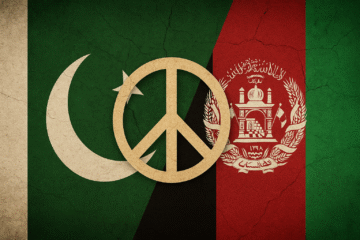
0 Comments